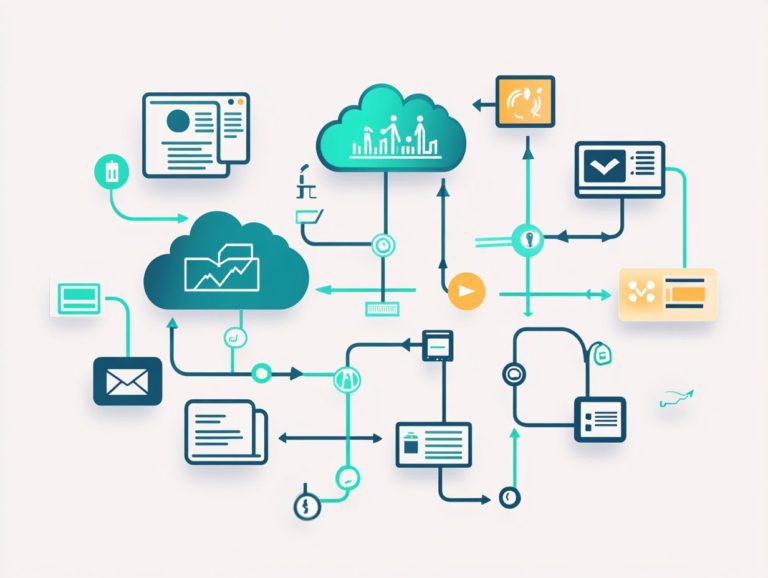10 Common Questions About Cloud Cost Management
In today’s digital landscape, managing cloud costs is essential for businesses of all sizes. As cloud services continue to gain traction, understanding the details of managing cloud costs has become vital for optimizing your budgets and maximizing your ROI.
This article tackles ten common questions, delving into the fundamentals of cloud cost management, best practices, and potential pitfalls. Whether you seek to refine your cost control strategies or simply want to deepen your understanding of this critical aspect of cloud computing, you ll discover insights that can drive your business forward.
Contents
- Key Takeaways:
- 1. What Is Cloud Cost Management?
- 2. Why Is Cloud Cost Management Important?
- 3. How Does Cloud Cost Management Work?
- 4. What Are the Benefits of Cloud Cost Management?
- 5. How Can a Business Monitor and Control Their Cloud Costs?
- 6. What Are the Common Mistakes Businesses Make in Cloud Cost Management?
- 7. Is Cloud Cost Management Different for Different Cloud Providers?
- 8. How Can a Business Determine Its Cloud Cost Management Needs?
- 9. What Are the Best Practices for Cloud Cost Management?
- 10. How Much Does Cloud Cost Management Cost?
- What Are the Key Metrics to Track in Cloud Cost Management?
Key Takeaways:

Cloud cost management is the process of monitoring, analyzing, and controlling cloud expenses to optimize usage and reduce costs, making it essential for understanding the future of cloud cost management.
Proper cloud cost management is crucial for businesses to avoid overspending and maximize the benefits of cloud services.
It involves setting budgets, tracking spending, and utilizing tools and best practices to optimize cost efficiency and performance.
1. What Is Cloud Cost Management?
Cloud cost management is your strategic pathway to mastering and controlling cloud expenditures. This allows you to maximize outcomes while extracting substantial value from your cloud investments.
This process involves a variety of practices, including cost allocation, resource allocation, and establishing a governance structure. These are all designed to enhance the efficiency of your cloud services while keeping a close eye on resources and expenses.
Effective cloud cost management is essential. It helps you optimize your cloud usage. Key elements include a robust governance framework that clearly defines roles and responsibilities, along with a systematic approach to cost allocation, ensuring transparency in resource utilization and billing. Understanding the factors affecting cloud cost management can further enhance your strategies.
For example, by implementing tags and labels, you can trace costs tied to specific projects or teams. This aids in making more informed decisions regarding cloud investments.
Financial Key Performance Indicators (KPIs) are important metrics that help you measure success. They include cost per service or utilization rates, which are crucial for assessing whether your cloud solutions effectively meet organizational needs.
These metrics not only help you identify areas ripe for improvement and potential savings but also empower you to allocate your budget more wisely toward effective cloud strategies.
2. Why Is Cloud Cost Management Important?
Cloud cost management is crucial if you want to optimize your cloud investments. It helps identify cost-saving opportunities and maximizes business value, leading to more efficient cloud spending.
Without proper oversight, you risk watching your cloud expenditures inflate. This often occurs due to underutilized resources and misallocated budgets. Don’t let overspending hurt your bottom line!
Effective cloud cost management enables you to streamline operations, ensuring that you leverage resources wisely. By aligning cloud expenses with your financial KPIs, you can better track your ROI and forecast budgets with accuracy. For more detailed strategies, consider exploring 10 insights on cloud cost management to enhance overall performance.
This approach ultimately drives more strategic initiatives and supports your long-term growth.
3. How Does Cloud Cost Management Work?
Cloud cost management is driven by a blend of automated procedures, real-time cost tracking, and cloud intelligence, providing you with the insights needed for 5 key takeaways for cloud cost management success and enabling you to make informed decisions about your cloud resources and their usage.
This refined approach not only streamlines your expense monitoring but also enhances the strategic allocation of resources across your various projects.
For example, tools like AWS Cost Explorer and Google Cloud s Billing Reports allow you to visualize your spending patterns, identify anomalies, and forecast future costs with greater accuracy.
Additionally, resource monitoring tools such as CloudHealth and Spot.io provide valuable insights into your resource utilization, enabling your teams to optimize operations and cut unnecessary expenditures.
By automating processes like rightsizing and scheduling through platforms like Azure Automation, you can significantly reduce waste and boost your overall cloud efficiency.
4. What Are the Benefits of Cloud Cost Management?

The benefits of cloud cost management are numerous. They allow you to achieve cost optimization, enhance cloud efficiency, and maximize outcomes while minimizing waste and unnecessary costs tied to your cloud investments. Consider implementing 10 tips to reduce cloud costs for even better results.
By better managing resources, you can ensure that your funds are channeled toward the most impactful projects rather than being wasted on unnecessary expenses. This strategic approach helps you leverage savings plans, leading to significant cost reductions over time.
Having enhanced visibility into your cloud spending gives you the insights necessary to align your expenditures with broader business objectives. These advantages streamline your operations and empower better decision-making, enabling you to quickly adapt to changing market demands and promote lasting success.
5. How Can a Business Monitor and Control Their Cloud Costs?
You can effectively monitor and control your cloud costs by using advanced resource monitoring techniques and implementing strong cost allocation strategies. Utilizing cloud analytics also provides valuable insights across various cloud providers.
By adopting these methods, your organization can establish a sustainable financial framework. Cloud management tools help your teams track expenses in real time, allowing them to identify spending patterns and eliminate wasteful practices.
Understanding the nuances of cost allocation ensures that resources are assigned to the right departments or projects, enhancing accountability. With cloud analytics, you gain invaluable data that helps stakeholders make informed decisions and optimize resource usage.
This strategic approach improves overall efficiency and fosters financial health, giving your business the power to invest in growth opportunities.
6. What Are the Common Mistakes Businesses Make in Cloud Cost Management?
Many businesses fall into common pitfalls when managing cloud costs. Overlooking unassigned expenses, failing to implement effective budgeting practices, and neglecting the importance of right-sizing can lead to significant waste.
These mistakes waste money and limit your growth. In particular, poor budget tracking may cause you to misallocate funds, invest in unnecessary services, or miss out on substantial discounts available for reserved instances. Improper resource allocation can leave you with idle resources that incur costs without delivering value.
To tackle these challenges, establish a rigorous framework for continuous evaluation against financial KPIs. Regularly analyze your spending patterns and adjust your budgets accordingly to ensure optimal resource utilization and fiscal responsibility. This aligns your cloud strategy with your organizational goals.
7. Is Cloud Cost Management Different for Different Cloud Providers?
Cloud cost management can vary widely among different cloud providers like Amazon Web Services, Microsoft Azure, and Google Cloud. Each offers its own unique set of management tools and pricing models, so you’ll need to craft tailored strategies by referring to understanding cloud cost management strategies to meet your specific needs.
The differences in pricing structures significantly impact how you budget for your cloud resources. For instance, AWS might use a pay-as-you-go model, while Azure leans towards reserved instance pricing. Understanding your specific usage patterns and operational requirements is crucial.
Each provider also has its own array of tools. For example, AWS’s Cost Explorer helps you analyze your spending, Azure’s Cost Management and Billing tracks costs, and Google Cloud’s Billing Reports helps monitor expenses. These tools offer various functionalities that can help you track expenses and optimize resource allocation efficiently.
By deepening your understanding of these environments, you can refine your cloud cost management strategies to better align with what each provider offers, ultimately streamlining your financial planning processes.
8. How Can a Business Determine Its Cloud Cost Management Needs?

To determine your cloud cost management needs, start by assessing your cloud investment levels and examining relevant financial KPIs. Don t forget to consider the necessary cloud metrics that will enable effective management.
This process requires you to analyze several factors, including the specific services you utilize and the scale of your operations moving to the cloud. Additionally, consider any ongoing projects that leverage these resources.
As you navigate this evaluation, it s crucial to ensure that your cloud strategy aligns seamlessly with your broader business objectives. Doing so will help you identify discrepancies in expenditure and pinpoint areas where you can boost efficiencies.
Ultimately, aligning your cloud initiatives with desired outcomes not only streamlines costs but also lays the groundwork for informed budgeting decisions tailored to your unique operational dynamics.
9. What Are the Best Practices for Cloud Cost Management?
Implementing best practices for cloud cost management is essential for creating an awareness of costs. Key strategies to consider include centralized governance, effective budgeting, and harnessing cloud analytics to enhance efficiency.
You can enhance your approach by conducting regular audits to pinpoint unused or underutilized resources. This enables you to reallocate or terminate those services effectively, ensuring that every dollar counts.
You should establish lifecycle rules so that resources are only deployed when needed. This can significantly reduce unnecessary spending.
Optimizing resource allocation through tagging offers better insights into your cost centers, allowing your teams to track expenditures with precision.
Companies like Netflix and Adobe have successfully embraced these strategies, resulting in substantial reductions in their cloud expenses while still maintaining robust performance and scalability.
10. How Much Does Cloud Cost Management Cost?
The cost of cloud cost management can vary significantly based on the tools and third-party solutions you choose, as well as the complexity of your budgeting needs and the level of cost optimization tailored to your organization.
You need to assess your unique requirements to determine the most suitable pricing model. This could be subscription-based, where you pay a fixed fee regularly, or pay-as-you-go options that align expenses with your actual usage. This flexibility can drastically change your cloud spending in your favor!
For businesses that successfully implement these management tools, the initial costs can be offset by avoiding overspending and optimizing resource utilization. Ultimately, selecting the right cloud management solutions not only enhances your financial efficiency but also drives long-term savings, making it a strategic investment that deserves your consideration.
What Are the Key Metrics to Track in Cloud Cost Management?
Tracking key metrics in cloud cost management like cost allocation (figuring out which part of your business is using how much of your cloud resources), cloud metrics, financial KPIs (Key Performance Indicators), and unit cost metrics is crucial for you to evaluate cloud efficiency and ensure optimal resource monitoring.
By analyzing these metrics, you can pinpoint areas where costs may be getting out of hand, allowing you to make proactive adjustments to your spending. For example, diving into cost allocation can reveal which departments or projects are racking up higher expenses, enabling you to make informed budget adjustments. Similarly, financial KPIs can highlight trends over time, making it easier for you to compare against operational goals and historical data.
Unit cost metrics provide valuable insights into how effectively you re utilizing resources, promoting efficient usage and minimizing waste. Altogether, these metrics not only enhance your decision-making processes but also cultivate a culture of accountability, ensuring that every dollar spent aligns with your strategic objectives.
What Are the Potential Risks of Not Managing Cloud Costs?

Failing to manage cloud costs effectively can expose you to significant risks, including escalating wasted cloud resources, unexpected costs, and the inability to meet your financial KPIs. This can quickly threaten your organization s financial health.
Take, for instance, a mid-sized tech firm that, due to a lack of visibility into its cloud spending, found itself grappling with skyrocketing monthly bills. It overshot its allocated budget by more than 30%.
This unexpected financial strain forced the organization to scale back on critical projects and freeze hiring, severely impacting its growth trajectory.
In another scenario, an e-commerce business experienced a dramatic drop in operational efficiency as it continued to pay for unused cloud resources. This wasted funds could have been better invested in marketing and customer engagement.
These examples clearly illustrate how unmanaged cloud costs not only strain your finances but also hinder your overall effectiveness and strategic initiatives.
How Can Automation Help with Cloud Cost Management?
Automation plays a crucial role in your cloud cost management strategy by streamlining processes, enhancing cloud analytics, and enabling efficient resource monitoring essential components for effective cost optimization.
By significantly reducing the likelihood of human error, automation safeguards you against unexpected expenses and data inaccuracies that can derail your budget forecasts.
When you leverage tools like Terraform, a tool for automating cloud infrastructure, and AWS CloudFormation, you can automate infrastructure deployment. This ensures that your environments are consistent and repeatable.
Such measures minimize the risk of manual configurations that may introduce inconsistencies and errors.
Consider Azure Automation, which illustrates how automated updates and scaling can keep your performance at its peak. This ensures that resources are only utilized when necessary, thereby reducing unnecessary costs.
Automated monitoring tools like Datadog provide real-time insights into resource usage, enabling proactive adjustments that maintain tight budgetary controls.
What Are the Future Trends in Cloud Cost Management?
Future trends in cloud cost management increasingly emphasize advanced cloud intelligence, integrated governance structures, and sophisticated budgeting techniques, all designed to enhance cost optimization in a rapidly evolving cloud landscape.
The integration of AI-driven insights and predictive analytics is revolutionizing how you assess spending and forecast future costs. By leveraging machine learning algorithms, you can anticipate usage patterns and identify potential savings opportunities before they materialize.
Centralized governance is becoming essential, helping you guard against unforeseen expenses and ensure compliance across teams. This proactive approach to cost management streamlines your decision-making process and cultivates a culture of accountability.
It enables you to allocate resources more effectively, maintaining a competitive edge in the cloud economy.
How Can a Business Justify the Cost of Cloud Cost Management?
You can truly justify the expense of cloud cost management by showcasing how it can elevate business value, enhance financial KPIs, and implement effective cost-saving measures that ultimately boost cloud efficiency.
By meticulously analyzing ROI metrics over time, you can uncover valuable insights that highlight immediate reductions in expenditure and reinforce your strategic positioning in the market.
Numerous case studies illustrate how companies have successfully navigated the complexities of cloud cost management, revealing substantial long-term savings.
For instance, firms that have invested in comprehensive cost management tools often report enhanced decision-making capabilities. This enables them to maximize resource allocation and optimize spending.
The benefits of streamlined operations and improved resource utilization frequently surpass initial investments, providing a robust justification for cloud cost management in both the short and long term.
Don t wait until it s too late start managing your cloud costs effectively today!
What Are the Common Misconceptions About Cloud Cost Management?
Many believe budgeting is unnecessary for cloud cost management. Others think automated processes can handle cloud waste on their own.
Mastering cloud cost management requires more than just monitoring. Crafting a solid budget is a game-changer! You must track real-time usage.
Ongoing analysis helps you identify patterns and unexpected changes. Relying solely on automation isn t enough; human oversight is essential to catch spending trends.
Striking the right balance keeps your cloud expenses in check. It also allows you to make the most of modern cloud solutions.






